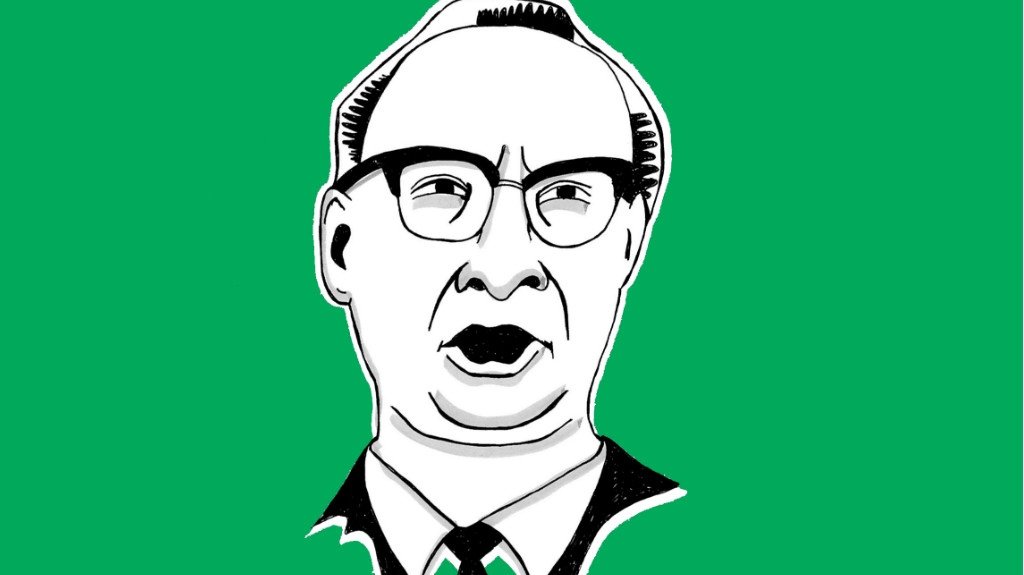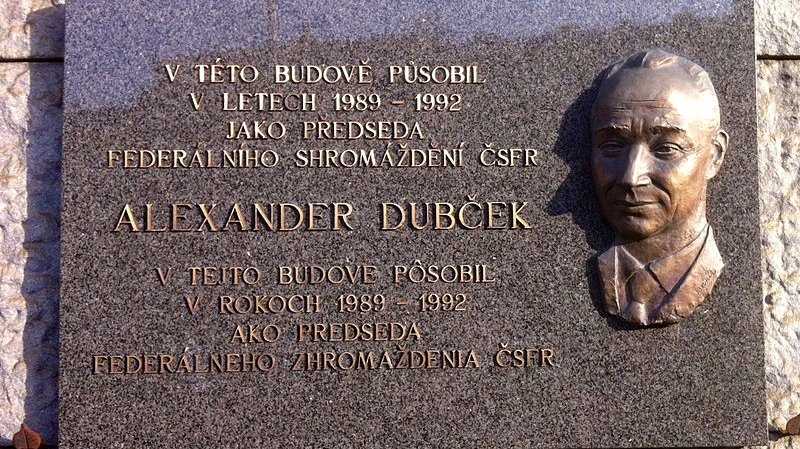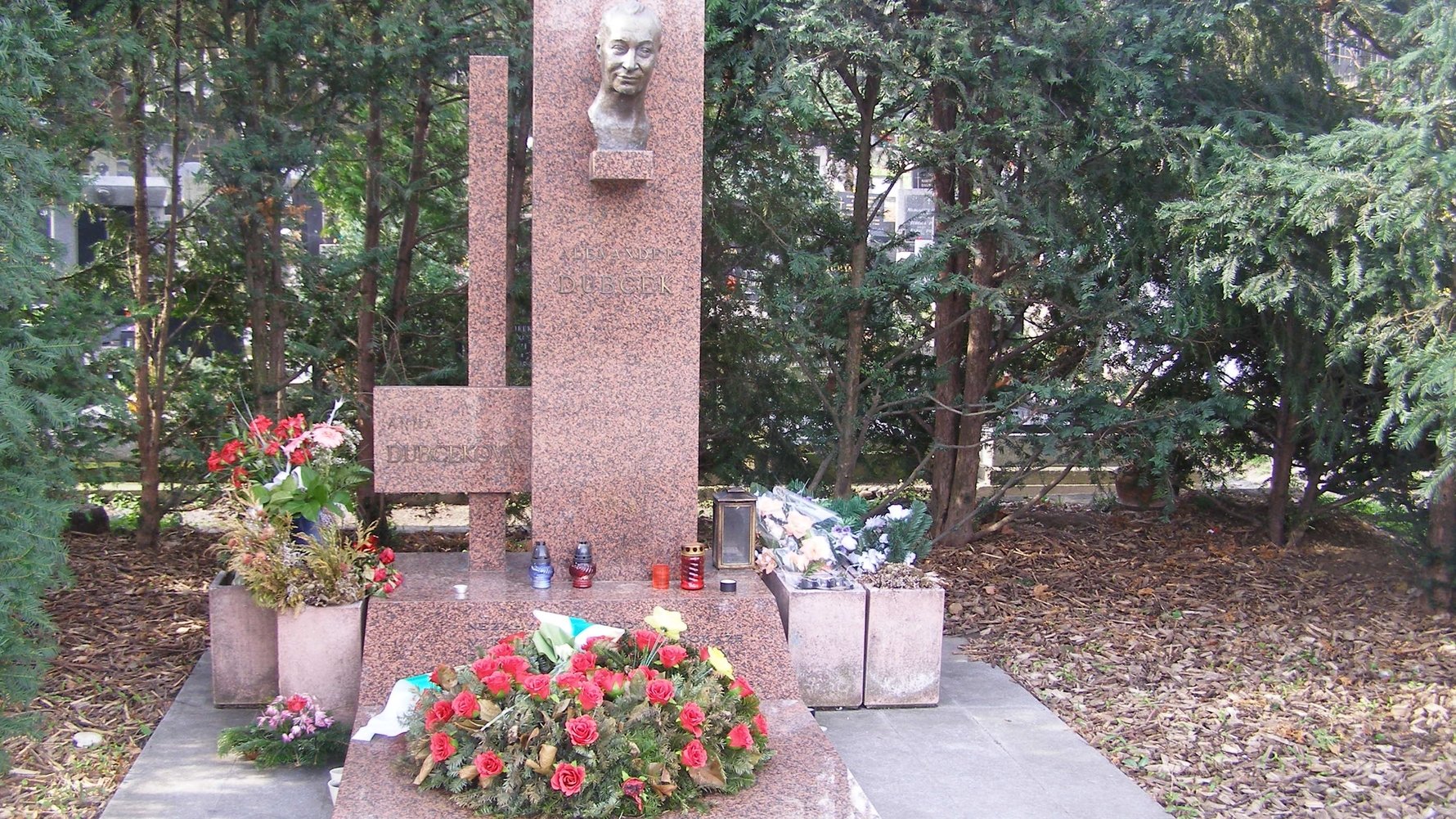This first name on the team sheet is a man who could arguably be described as a modern day Guy Fawkes, although his weapon of choice was reform as opposed to gunpowder. A man who didn’t even have the easily marketable face of old mate Fawkesy. His name was Alexander Dubček, and he could lay reasonable claim to being the most unremarkable personality in this book, although this book also contains chapters about KRUM THE FEARSOME, KING TVRTKO I and RAMBO AMADEUS, so maybe that is understandable.
Alexander Dubček was born in the village of Uhrovec on November 27, 1921. But it wasn’t long before the family was compelled by their devotion to socialism to heed the Soviet Union’s call to help build the Soviet state. In 1925 this took them to the glorious city of Frunze, now known as Bishkek, the capital of Kyrgyzstan, better known as the country nobody can ever remember how to spell.
Life in Kyrgyzstan wasn’t exactly glorious either. Many children who moved with their families to put in the hard work died of malaria fairly early on, and nobody was paid for the first year or so. The common language in the co-operative was Ido, a constructed language looking to build on the mistakes identified in Esperanto. For those looking to surprise and impress new chums, ‘How are you?’ would be ‘Quale vu standas?’. Linguistic originality aside, the co-operatives received little support from the Soviets and were fairly miserable places to be. The Dubčeks moved to the industrial town of Gorki (250 miles east of Moscow) in 1933, but just three years later Julius fell seriously ill. Back to Czechoslovakia once more for the Dubčeks. 13 years after moving to the Soviet Union they returned to their homeland, just in time to welcome the Nazis as they rolled into the Sudetenland.

As World War Two burst into flames in Europe, Slovakia became the most fanatical of Nazi puppet states. The vehemently socialist Dubček family was obviously a little perturbed by this, and both sons joined the illegal communist party almost immediately. In 1944 they both participated in the Slovak national revolt against the damn fascists. Alexander was wounded twice, Julius once, although Julius’ wound was more being killed than wounded. Reconciling himself after this tragic event, Alex married in 1945. Interestingly enough the wedding took place in church and was blessed by the pope, despite the intensely socialist leanings of Alex and his family.
Everything seemed to be coming up Milhouse just a few years later as the Communists came into power in Czechoslovakia. Prior to this Alex had worked an impressively varied amount of menial jobs in such thrilling locations as a factory, a gas station and cars. New hope of an exciting future came with the reds though, and Dubček was given a position in the party. From 1949 to 1955 he held various positions in the Slovakian Communist Party in Trenčín, Bratislava and Banská Bystrica. In the latter he was actually the regional secretary, his main role involved doing whatever necessary to increase agricultural production.
1956 saw Mr. Khrushchev give his famous speech at the Twentieth Party Congress, telling all and sundry of the various crimes committed by Stalin in prior decades. The ideology Dubček was surrounded by had been shaken to its core, but with this came renewed hope of a reformed version of socialism. Dubček returned to Czechoslovakia in 1958 and was subsequently made regional secretary of the party in the Slovak capital of Bratislava. His rise through the party had begun, and a year later he replaced Karol Bacílek as First Secretary of the Slovak Communist Party.
Antonín Novotný was the First Secretary of the Communist Party of Czechoslovakia, and he was what could be described as a ‘hardline Stalinist dude’. He had been in charge since 1953, and had continued Czechoslovakia’s attempt to mimic the Soviet Union at quite the pace. Show trials led to around 100,000 party members jailed. The economy was in ruins, and the make up of the party was heavily skewed in favour of the Czechs as opposed to their Slovak brethren. The people of Slovakia were growing more and more miffed at being run by the Czechs from the former Bohemian capital of Prague.

If Novotný hadn’t done such a spectacularly guff job of running the communist party in Czechoslovakia, Alexander Dubček would have almost certainly have faded into obscurity (not unlike a teabag). Dubček had actually allowed (and encouraged, to a certain degree) criticism of Novotný in the Slovakian media, and by the autumn of 1967 it’s fair to say the writing on Novotný’s wall was engraved into the plaster. Within the first week of 1968 Antonin had found himself on his way out of the driver’s seat, and our dependable teabag from Uhrovec landed himself in pole position.
Dubček’s ascension to the top of Czechoslovakia was in equal respects both shocking and expected. It was shocking in that he was the most important nobody in international politics, as memorable as Stoke City vs. Fulham in the 2008-09 English Premier League. It was expected for precisely this very same reason. Dubček had impeccable socialist credentials and had proven himself dedicated to the cause time and again, so the hardliners were in favour of his rise. He was also Slovakian and a believer in the idea of two states within a Czecho-Slovakia, and the fact that many top Czechs were allies of Novotný and irrevocably tainted by that association also helped. If I haven’t rammed home the point enough by now, Dubček was nothing more than a modest chap who enjoyed football. Things were about to get a lot more interesting for our teabag.
Leonid Brezhnev was the big dog in the Soviet Union at the time, and Dubček’s relationship with Lenny was pretty stellar. Brezhnev visited Prague in February of 1968, just in time for Dubček to give a speech promising the ‘widest possible democratisation of the entire socio-political system’. He said this in Slovak obviously, not English. It was at this time that Dubček published his Action Program, setting out a plan for change in Czechoslovakia. There would be more personal freedoms, a new Slovak constitution, economic liberalisation and a move towards political reform. None of this was done with any intention of doing away with communism, quite the opposite in fact. Dubček was still commie down to his toes, merely wanting to create the socialist utopia that the idea initially promised. Lenny was a little concerned however, and the Kremlin became deeply suspicious of our James Milner.
The reform movement began to pick up pace, to the point where Team Soviet Union demanded a meeting with Team Czechoslovakia. The Soviets refused to withdraw any of their forces from the country, accusing Dubček of protecting counter-revolutionaries. The meeting came, the meeting passed, the meeting ended unsatisfactorily. Dubček was naive to the fact he was duffing up relations with the Soviets, despite his constant assurances that Czechoslovakia was an inseparable part of a world socialist system. It probably didn’t help that in the spring of 1968 he had made the wise (yet foolish) move of replacing all the hardliners in the party with those more partial to reform. Diplomacy and conferences failed, as neither side would budge. Dubček was absolutely convinced that entering into trade agreements with the west and putting together an independent foreign policy within the framework of international socialism would only strengthen the aims of the ideology. The intellectuals of the nation agreed, because obviously, and popular support in Czechoslovakia was on their side. This is what became known as the Prague Spring.

Unfortunately, the Soviets and many of their fellow Warsaw Pact nations weren’t so convinced, and they were about to do something about it. In the early hours of August 20, 1968, some 300,00 troops from Hungary, East Germany, Bulgaria, Poland and the Soviet Union invaded Czechoslovakia in what was the largest military operation in Europe since the Second World War. Claiming that he hadn’t heeded any of their warnings or ultimatums, Dubček was arrested and shipped off to Moscow. Fearing that Brezhnev wouldn’t stop until Czechoslovakia was engulfed by the Soviet Union, Dubček caved. On August 27, one week after the tanks had rolled into Prague, Dubček gave a tearful speech reversing many of the reforms. Springtime was over.
After resigning Dubček took up the relatively harmless position of President of the Federal Assembly, and just nine months later he was given the practically pointless position of ambassador to Turkey. He was shipped off to Turkey due to his irritating continued popularity at home, but this deal only lasted six months. In June 1970, Alexander Dubček was expelled from the party that had been his entire life and shipped off into exile. He couldn’t speak to anyone outside of his family without the consent of the government.
Redemption would come for Dubček with the Velvet Revolution in 1989, giving a tearful speech in front of an adoring crowd in Prague to usher in a new age for Czechoslovakia. Václav Havel summed it up best by noting that ‘history has finally come back to Czechoslovakia’. Dubček was against the break up of Czechoslovakia, but his enduring popularity meant that he was a favourite for the Slovak presidential office as the Velvet Divorce approached. Before this could happen, Alexander Dubček contracted death in November 1992 as a result of injuries suffered in an automobile accident. Alexander Dubček will go down in history as one of the most remarkably unremarkable men to ever walk the planet. He was the everyday man who found himself in a position of real power, tried to use it for good but was put down by bigger boys. He was the teabag we could all believe in.
An Illustrated History of Slavic Misery’ is available for purchase at Poshlost Books, linked here, and the digital version is there too. There are also books about Bosnia and Prague available.


Comments